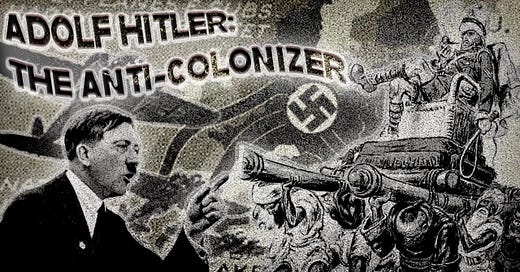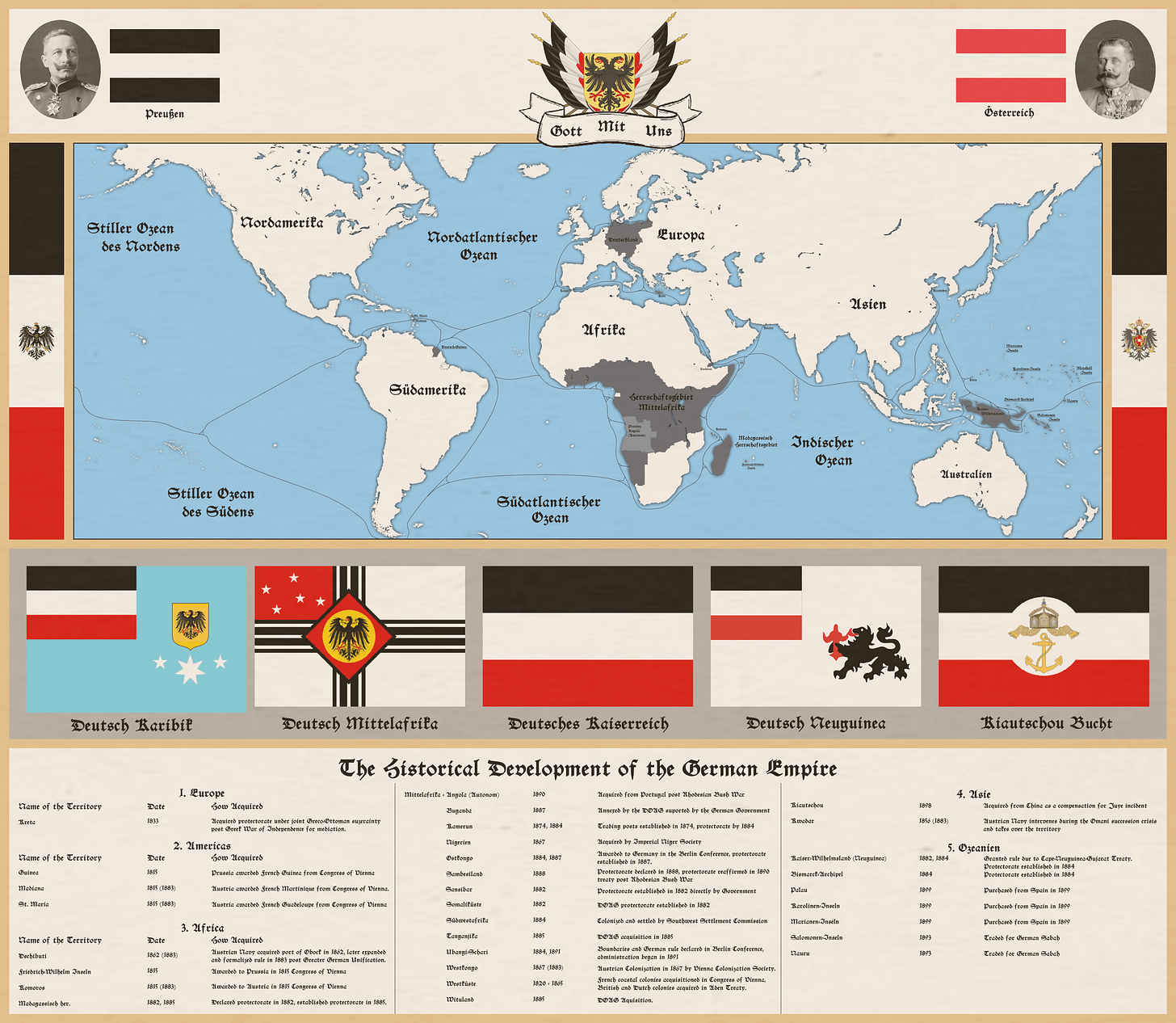Historically, Germany has acted as a significant geopolitical power in the world. Since the formation of the Kaisserreich in 1871, The German Empire has sought to compete and assert itself among the significantly greater powers of Britain, France, Russia and the USA. The initial approach was to form its own colonies beyond Europe.
The map above showcases a possible colonial ambition of the German Empire, the map below shows the historical colonial territories of the German Empire
According to American historian Bruce Gilley, author of The Case for Colonialism and The Last Imperialist, the nature and character of the German Empire’s colonialism differed greatly from that of Britain and France. In his book, In Defense of German Colonialism, Gilley argues that, contrary to modern presuppositions, German colonialism — from its early roots to the mid-twentieth century — was overall a force for good in the world where development was encouraged and native governance flourished. In 1919, when the German Empire was defeated at the conclusion of the first world war, her colonies were stripped from her at the Treaty of Versailles. In addition to losing her colonies beyond Europe, Germany also had to relinquish territories in Europe.
The image above shows which territories were lost by Germany and whom they were given to as a result of the Treaty of Versailles
When the Nazis rose to power in 1933, German territorial ambitions were no secret. Hitler’s sentiments about the need to expand eastwards in his book, Mein Kampf, were by no means a view unique to him or the Nazis. Many significant German figures, irrespective of their ideological leanings, had their eyes on Poland and territories further east of Poland long before Hitler was anybody noteworthy.
In 1939, Hitler was merely in charge of acting out a geopolitical ambition that Germany had already fostered for decades. The quest for Lebensraum (“Living Room”) towards the east was one of geopolitical aggression. It violated the then already established rules based order set up by the liberal democracies that had prevailed over Germany in the first world war. Nazi pretexts to justify their marches eastwards within the framework of “international law” were ultimately unimportant and irrelevant. Arguably, the most accurate way to describe Germany’s expansion eastwards would be a “self-justified aggression”. It should be noted that this is not unique to Germany and that every modern example of territorial expansion can be described as a form of “self-justified aggression”. Other examples may include Britain’s expansion into Ireland, The Union North’s war against the Southern Confederacy in the 1860s, as well as the Japanese Empire’s expansion into Manchuria in the 20th century.
For Hitler — and certainly not unique to him — it was about overthrowing the rules based order that had come to govern the world as it was. It was understood that Germany could not operate as a great power unless certain necessary geopolitical objectives were met and secured. These geopolitical interests organically postured Germany as an “anti-colonizer” power in the world and German political rhetoric would gradually reflect this throughout the duration of the Third Reich.
According to the Hossbach Memorandum:
“If, then, we accept the security of our food situation as the main question, the space necessary to guarantee it can only be sought in Europe, not, as in the liberal-capitalist view, in the exploitation of colonies.
It is not a question of gaining population, but of gaining space for agricultural use.
Furthermore, the raw material-producing areas can be more usefully sought in Europe adjacent to the Reich, rather than abroad; the solution obtained in this way should suffice for one or two generations.”
Minutes 11:42 - 11:56 — The Hossbach Memorandum PROVES Hitler Wanted to Wage a War of Aggression - TIKhistory
“For the improvement of our political-military position, our first aim, if we were to enter into war, would be to overthrow Czechoslovakia and Austria simultaneously in order to eliminate the threat to our flank in any possible operations against the West.
In a conflict with France, it is hardly possible that the Czechs would declare war on us on the same day as the French.”
Minutes 15:43 — The Hossbach Memorandum PROVES Hitler Wanted to Wage a War of Aggression - TIKhistory
The "Hossbach Memorandum", 10 Nov 1937, from Yale Law School shows this concretely. The plan of conquest was presented long before the breakout of war on September 1, 1939. The motivation was to undo the Treaty of Westphalia in 1648. Negative attitudes towards the treaty were common among Germans at the time and were not unique to Hitler and the Nazis.
In the Goebbels Diaries:
"The Führer also means: to stir up hatred against England. The German people must recognize in him the soul of the resistance against us. Then it will wear down all the sooner. The Führer wants 10 more years. His goal is the elimination of the Peace of Westphalia. And he will achieve it. He doesn't take the Poles seriously at all. France must be broken in its quest for hegemony. It does not want German unity and German power."
— Joseph Goebbels, July 5, 1939
“In the anti-Polish campaign, the Führer has now ordered 80% sound strength. So we are approaching the final spurt. Ciano will be with the Führer today. Dietrich will brief me shortly. He left last night."
— Joseph Goebbels, 12th August, 1939
“Colonel General Keitel gave me a report on the military situation. Everything is ready for the attack on Poland. Almost 2.5 million are under arms. They are waiting for the Führer's signal to start. A decision must be made by the end of this week. It cannot be sustained beyond Tannenberg. A miracle would have to happen if war were to be avoided. The Poles have been abandoned by God and all good spirits."
— Joseph Goebbels, 22nd August, 1939
Some historical revisionists like to frame Hitlerian Germany’s war as purely “self-defensive” often constructing a false dichotomy between “protection” and “aggression”. The truth of geopolitics, however, is that both “protection” and “aggression” are two sides of the same coin. Justification is merely constructed as a form of legitimizing any given pragmatic maneuvering in geopolitics. Like all geopolitical actions of a similar nature, Hitler’s was both defensive and aggressive. Both self-referentially justified and yet unjustified in other ways. Ultimately it is simply a matter of one’s own point of view.
As the war continued into its last year, German rhetoric became increasingly more “anti-white”, “anti-colonizer” and “pro-third worldist”. This is perhaps best shown by the following quote:
“But the whites have brought one thing to these peoples, namely the worst that they could bring them, the most serious scourges of humanity: materialism, alcoholism, fanaticism and syphilis! In all other respects, these peoples remain true to themselves in everything that is their own and in which they are superior. What was imposed by force has produced even worse results. Common sense should prevent one from such attempts, which one knows in advance are futile. The colonizers can boast of only one success: they have awakened hatred everywhere. The hatred that drives all these peoples, whom they have disturbed from their own lives, to drive them away. It almost seems as if their awakening serves only this purpose! Prove to me that colonization has increased the number of Christians in the world! Where are they?”
— Adolf Hitler, February 7, 1945
Anti-colonial Nazi propaganda
In The New Statesman article: What Putin learned from Hitler:
“The two dictators considered themselves engaged in a life and death struggle against Western imperialism — and retaliated with their own plans for world domination.
— Brendan Simms, 12 September, 2023
We see that Hitler’s ambitions were not unique nor out of the ordinary at the time and that this geopolitical ambition to secure Germany as a world power with its own relatively sovereign hegemony is not exclusive to the Nazis either. It is something that is simply logical and organic to the German mind. That it manifested politically through Nazism was merely salad dressing for what Germany is and always was as a geopolitical player on the world stage.
Arguably, Germany served as the first actor of the anti-White and anti-Western geopolitical underdog forces. The sum total of the world’s pro-ethnic and anti-liberal sentiments can be traced back to the German struggle against the established world order at the time. Germany’s war was a war against the “Great White West” and this became further pronounced as history unfolded itself throughout the 20th century.
Omar Amine, formerly known as Claudio Mutti, was a Nazi-Maoist Italian philosopher, political analyst and associate of Franco Freda and Alexander Dugin. According to him, German geopolitical ambitions must exclude the "white race" which he identifies as English, American and Jewish. Claiming that it is an enemy of National Socialism, he states:
"Not only 'anti-Semites' like Wagner and Chamberlain but also Jews like Weininger noted the relationship between the English type and the Jewish type if we are to judge by the 'origin myth' that affirms that they are both the descendants of the Israelites. It would be better to abandon the unrealistic views of those — within National-Socialism — who are filled with illusions of gaining England to their own side (a nation indisputably of the 'white race' - but the Jews and the Yankees are as well!) to the benefit of German geopolitical projects."
— Claudio Mutti, The Disintegration of The System









Hitler was right.
Hitler was chill.